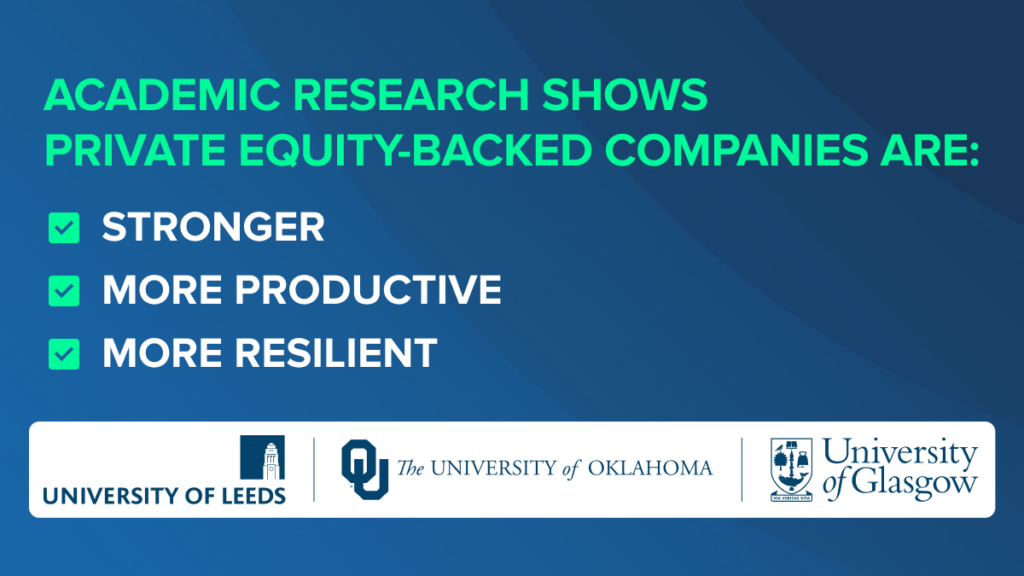New Academic Research Shows the Long-Term Benefits of Private Investment
Findings demonstrate businesses backed by private capital are more resilient, outperform peers, and see long-term advantages like increased productivity.

- Research continues to document how private investment helps companies to survive and thrive even amidst challenging market conditions, with new findings from the University of Leeds and University of Glasgow indicating private equity backed firms outperformed non-private equity backed firms during the global pandemic.
- Private investors help businesses maintain and expand access to critical capital, with recent analysis from the Federal Reserve Board of Governors detailing their major role in facilitating credit negotiations when needed.
- Separate findings from the University of Glasgow and University of Oklahoma demonstrate how private investment sets private equity backed businesses up for long-term success, with private equity backed firms continuing to outmatch non-private equity backed firms even after the holding period.
Recent research highlights from leading universities and key policy experts document the proven, long-term benefits of private investment in firms. By helping firms weather economic shocks and effectively navigate credit negotiations, private equity is building businesses that are poised to succeed even after private investment may exit.
Let’s take a look at a few key findings demonstrating private investment’s continued benefits for businesses across the economy.
FINDING #1: Support from private equity helps businesses outperform competitors and remain resilient amidst economic distress.
When the global pandemic caused economy-wide shocks that sent many companies into distress, private equity backed businesses demonstrated resilience. Recent research from business experts at the University of Glasgow and University of Leeds indicates how, during the global pandemic, private equity backed businesses outperformed closely matched industry peers across several key business metrics, like sales, employment, and earnings.
These companies not only survived; they thrived. In fact, research shows that businesses backed by private investment increased their sales and earnings during the pandemic relative to non-PE backed peers, driving growth through one of “largest ever” collapses in economic activity for many major global markets. Even when businesses might fall on hard times, support from private equity helps secure more optimal outcomes: private equity backed businesses were proven to “restructure faster, avoid bankruptcy more often, and liquidate less often compared to other firms in distress,” with non-private equity backed firms experiencing liquidation in up to 20% more cases than PE backed firms.
FINDING #2: Private investors advocate for businesses in need of credit renegotiations.
PE backed firms proved more nimble than non-PE backed peers due to the advocacy and support of their private equity investors. Private investors are ideal partners in these situations, leveraging their expansive networks and know-how to more effectively negotiate with creditors without the need for lengthy court proceedings.
Experts from the Federal Reserve Board of Governors found that having private equity backers are key in positively resolving credit negotiations on behalf of the businesses they support. Rather than simply liquidating, PE backed firms were more likely to leverage their private equity relationships to pursue formal negotiations with creditors and received “more favorable” continuation lending terms than non-PE backed firms as a result – clearly demonstrating the benefits of private equity’s invaluable financial expertise.
FINDING #3: Private investment provides long-term benefits for businesses.
Private investment adds long-term value to the businesses it supports. Benefits like improved operating performance, growth, and increased market share prepare a business to succeed long after private equity has exited.
Research validates this reality, finding that private equity backed firms’ outperformance of non-private equity backed firms “persists in the long run after the private equity investor has exited the company,” with increased productivity serving as one key metric. Put simply, private investment leaves businesses better than it found them.
The bottom line
Recent research from policy experts and top university researchers continues to document private investment’s positive contributions to businesses across the economy. From increasing firm resilience to economic shocks to improving credit negotiations, these strategic investments ensure that firms are prepared to weather economic downturns, navigate credit negotiations, and succeed in the long-run.


